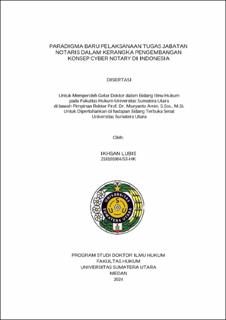Paradigma Baru Pelaksanaan Tugas Jabatan Notaris dalam Kerangka Pengembangan Konsep Cyber Notary di Indonesia
New Paradigm of The Duties of Notary Duties Within The Framework of Cyber Notary Concept Development in Indonesia

Date
2024Author
Lubis, Ikhsan
Advisor(s)
Muwadji, Tarsisius
Sunarmi
Sukarja, Detania
Metadata
Show full item recordAbstract
The digital transformation has influenced the working paradigm of notaries
in various countries, including Common Law, Civil Law, and Indonesia. The
challenge in implementing Cyber Notary relates to the legal aspect of evidence,
particularly within the Information and Electronic Transactions Act (ITE). There is a
need for a strong legal foundation in the Notary Law to accommodate technological
changes and provide legal certainty. The First Amendment to Law No. 19 of 2016 and
the Second Amendment to Law No. 1 of 2024 on Law No. 11 of 2008 have responded
positively to digital developments, creating an inclusive legal framework for the
utilization of technology in ITE. This dissertation employs normative legal research
with a prescriptive analytical nature, prioritizing secondary data such as primary,
secondary, and tertiary legal materials. Primary research data are obtained from
field research through interviews. A conceptual legislative approach is utilized in the
research methodology. Data analysis is qualitative, and conclusions are drawn
through deductive reasoning methods. The research findings indicate the necessity of
a uniform legal umbrella from the Notary Law regulations (UUJN) by expanding the
authority of notaries beyond conventional public services, particularly in the
authentication of electronic deeds. The opportunity for implementing the Cyber
Notary concept, as reviewed through the amendment of Article 5 of Law No. 1 of
2024, can be interpreted as an innovation reflecting a positive response to
technological advancements by creating an innovative, inclusive, and adaptive legal
framework to support digital notaries. The new paradigm in the execution of notarial
duties transforms the way work is done through the legal reconstruction of Cyber
Notary by leveraging digital technology as a means to assist tasks and meet the
demands of the times, which require a practical, fast, and easy legal service system.
Collections
- Doctoral Dissertations [167]
